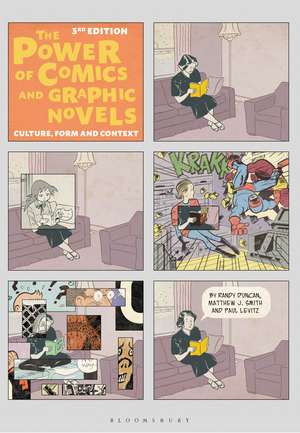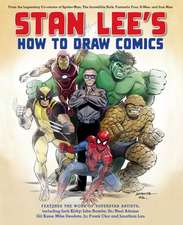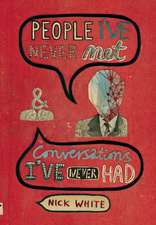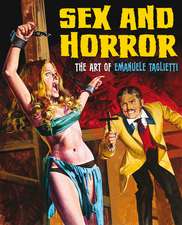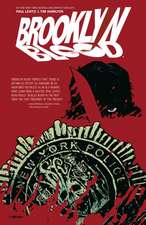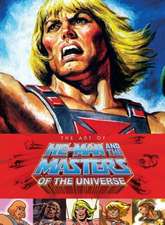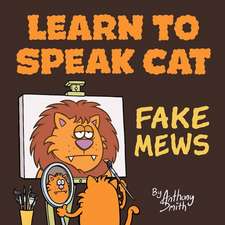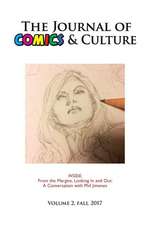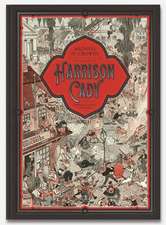The Power of Comics and Graphic Novels: Culture, Form, and Context
Autor PhD Randy Duncan, PhD Matthew J. Smith, Paul Levitzen Limba Engleză Paperback – 18 oct 2023
| Toate formatele și edițiile | Preț | Express |
|---|---|---|
| Paperback (1) | 173.91 lei 3-5 săpt. | +56.32 lei 7-13 zile |
| Bloomsbury Publishing – 18 oct 2023 | 173.91 lei 3-5 săpt. | +56.32 lei 7-13 zile |
| Hardback (1) | 474.74 lei 3-5 săpt. | |
| Bloomsbury Publishing – 18 oct 2023 | 474.74 lei 3-5 săpt. |
Preț: 173.91 lei
Preț vechi: 197.37 lei
-12% Nou
Puncte Express: 261
Preț estimativ în valută:
33.28€ • 34.74$ • 27.54£
33.28€ • 34.74$ • 27.54£
Carte disponibilă
Livrare economică 15-29 martie
Livrare express 01-07 martie pentru 66.31 lei
Preluare comenzi: 021 569.72.76
Specificații
ISBN-13: 9781350253902
ISBN-10: 1350253901
Pagini: 392
Ilustrații: 188 bw illus
Dimensiuni: 169 x 244 x 25 mm
Greutate: 0.75 kg
Ediția:3
Editura: Bloomsbury Publishing
Colecția Bloomsbury Academic
Locul publicării:London, United Kingdom
ISBN-10: 1350253901
Pagini: 392
Ilustrații: 188 bw illus
Dimensiuni: 169 x 244 x 25 mm
Greutate: 0.75 kg
Ediția:3
Editura: Bloomsbury Publishing
Colecția Bloomsbury Academic
Locul publicării:London, United Kingdom
Caracteristici
Study objectives, discussion questions, activities and annotated reading guides throughout help students master the material, and a companion website features additional essays, sample syllabi and other resources to encourage students to explore the genre further
Notă biografică
Randy Duncan is Ellis College Distinguished Professor and Director of the Center for Comics Studies at Henderson State University. He is co-author of Creating Comics as Journalism, Memoir and Nonfiction (2015). He is co-editor, with Matthew J. Smith, of Critical Approaches to Comics: Theories and Methods (2011), Icons of the American Comic Book (2013), The Secret Origins of Comics Studies (2017), and More Critical Approaches to Comics: Theories and Methods (2019). Dr. Duncan is co-founder of the Comics Arts Conference, held each summer in San Diego.Matthew J. Smith is Dean of the College of Humanities and Behavioral Sciences and Professor of Communication at Radford University, USA, where he teaches the introductory Comics Studies course. Along with Randy Duncan, he is a co-editor of the Routledge Advances in Comics Studies Series and co-curator of the traveling exhibition, Marvel: Universe of Super Heroes.Paul Levitz is a former President and Publisher of DC Comics and has written for many of DC's major comic books series, including Superman and Justice Society. His story Legion: The Great Darkness Saga was voted one of the top 20 best comic stories of the last century by readers of The Buyers' Guide. He teaches a course in the American Graphic Novel at Columbia University and was named to the Will Eisner Award Hall of Fame in 2019.
Cuprins
PrefaceIntroductionUnit 1 - CULTUREChapter 1: Comics in Culture, Comics as CultureChapter 2: Making and Reading ComicsUnit 2 - FORMChapter 3: Encapsulation of the Narrative Chapter 4: Composition of the PanelsChapter 5: Layout of the PagesUnit 3 - GENREChapter 6: Genres of ComicsChapter 7: Memoir ComicsChapter 8: Superhero ComicsChapter 9: Emerging Genres: Journalism, Documentary, AdvocacyUnit 4 - CONTEXT & ANALYSISChapter 10: The Evolution of ComicsChapter 11: Exploring Meanings in ComicsChapter 12: Writing about ComicsGlossary Bibliography
Recenzii
Duncan, Smith, and Levitz have delivered an outstanding and much-needed volume that should be required reading in any of the growing number of comics studies classes in academia today. The Power of Comics provides historical, cultural, and literary approaches that will not only deepen students' understanding of this medium but help them develop the critical tools required to engage meaningfully with a host of other subjects and issues. Highly recommended.
As a textbook, it succeeds in content, scope, and execution. The chapters are well laid out, have thoughtful questions at their ends, and several chapters end with very practical examples of analysis that serve as models for students. Chapters also reference a broad range of experts . . . which further validates breadth and depth of this growing scholarship. . . . Overall . . . the book-including the theory chapters-is reasonably good for a 'first textbook on comics,' and I would imagine it will fast become a standard text for those sorts of classes.
Balancing its multi-angled scope, careful scholarship, and welcoming accessibility, Power of Comics remains the go-to textbook for analyzing and appreciating the ever-evolving comics medium.
An extremely comprehensive work, The Power of Comics offers a wealth of information and engages readers with an approachable and engaging style. This edition covers important new material, including updated sections on Graphic Medicine, comics production, libraries, and web comics. I applaud the authors' research, writing, and dedication to the field.
As a textbook, it succeeds in content, scope, and execution. The chapters are well laid out, have thoughtful questions at their ends, and several chapters end with very practical examples of analysis that serve as models for students. Chapters also reference a broad range of experts . . . which further validates breadth and depth of this growing scholarship. . . . Overall . . . the book-including the theory chapters-is reasonably good for a 'first textbook on comics,' and I would imagine it will fast become a standard text for those sorts of classes.
Balancing its multi-angled scope, careful scholarship, and welcoming accessibility, Power of Comics remains the go-to textbook for analyzing and appreciating the ever-evolving comics medium.
An extremely comprehensive work, The Power of Comics offers a wealth of information and engages readers with an approachable and engaging style. This edition covers important new material, including updated sections on Graphic Medicine, comics production, libraries, and web comics. I applaud the authors' research, writing, and dedication to the field.
